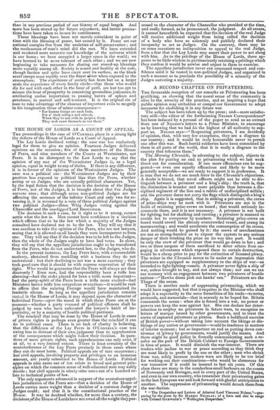A SECOND CHAPTER ON PRIVATEERING.
THE favourable reception of our remarks on Privateering has been gratifying, as showing that the moral sense of the community is alive to the atrocity of the practice, and as inspiring a hope that public opinion may embolden or compel our Government to adopt measures for abolishing it in any future war.
The subject has been taken up by the press; and—more satisfac- tory still—the editor of the forthcoming NELSON Correspondence* has been induced by a perusal of the paper to send us an extract from one of NELSON'S letters to a Prime Minister, to encourage us by knowing that we had his the highest of all authority to sup- port us. NELSON says—" Respecting privateers, I am decidedly of opinion, that, with very few exceptions, they are a disgrace to our country ; and it would be truly honourable never to permit one after this war. Such horrid robberies have been committed by them in all parts of the world, that it is really a disgrace to the country that tolerates them." The Morning Chronicle, in adverting to the subject, objects to the plan for putting an end to privateering which we last week threw out for consideration. If one more efficacious can be sug- gested—or even one equally efficacious and likely to be more generally acceptable—we are ready to support it in preference. It is true that we do not see much force in the Chronicle's objections. A doubt is hinted, that naval officers might not be able to dis- tinguish between a privateer and a king's ship : the truth is, that the distinction is broader and more palpable than between a dis- ciplined regiment of the line and a rabble of undisciplined militia ; and the privateer dares not carry the flags which distinguish a king's ship. Again it is suggested, that in sinking a privateer, the crews of prize-ships may be sunk with it. 'Pnrateers are not in the habit of retaining prize-crews on board ; that would seriously in- commode them, and it is not necessary. A privateer is not built for fighting, but for skulking and running ; a privateer is manned to enable her to overpower by numbers. Retaining prize-crews on board would crowd the already overcrowded vessel, and cramp its manceuvering ; and would accelerate the consumption of its stores. And nothing would be gained by it : the crews of merchantmen are not so strong-banded as to expose the captors to any serious danger of their retaking the prize on its way into port. It would be only the crew of the privateer that would go down in her ; and two or three cargoes of them sacrificed to deter others from en- gaging in adventures which exposed them to certain destruction, would be a cheap price to pay for the extinction of licensed piracy. The writer in the Chronicle seems to lie under an impression that privateers are equipped as supplementary to the ships of war—as intended to fight fighting-vessels. A privateer never fights a ship of war, unless brought to bay, and not always then; nor can we tax our memory with an engagement between two privateers of hostile nations—" Hawks dinna pick out hawks' een." Privateen are the Thugs of the ocean.
There is another mode of suppressing privateering, which we would have suggested, but that it requires in the Minister who shall adopt it a superiority to the mere formalities of his trade—to notes, protocols, and memorials—that is scarcely to be hoped for. Britain commands the ocean : when she is forced into a war, no power or powers can keep the seas against her. She can declare her deter- mination to employ no privateers in future wars, to recognize no letters of marque issued by other governments, and to treat the crews of captured privateers as pirates. Such a boldfaced exercise of British power—without taking into account the likings or dis- likings of any nation or government—would be insolence in matters of inferior moment ; but so important an end as putting down con- nivance at ,*piracy by governments, would justify the means. And there might be good policy in formally communicating such a re- solve on the part of the British Cabinet to Foreign Governments in time of peace. It would diminish the war-interest. There are traders who incline to war or peace according as they think they are most likely to profit by the one or the other ; men who shrink from war, solely because modern wars are likely to be too brief for working out their combinations—who would be clamorous for war tomorrow if it could be insured to last six years. Of this class there are many in the numberless small harbours on the coasts of Normandy and Bretagne, and in every part of the United States, and even in our own country, who remember their privateering gains in the last European war and look forward with gleeful anticipation to another. The suppression of privateering would detach them from the war-faction.
* "The Despatches and Letters of Admiral Lord Viscount Nelson,"—pre- paring for the press by Sir Iturnis NicoLes; of a form and size to range with Colonel GURWOOD'S "Wellington Despatches."


























 Previous page
Previous page